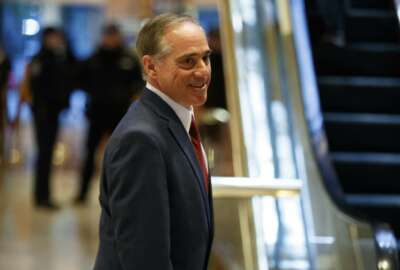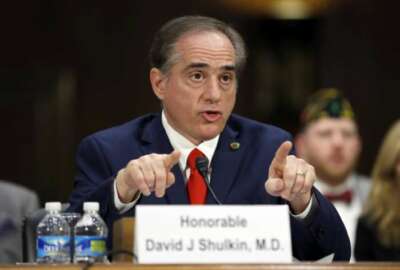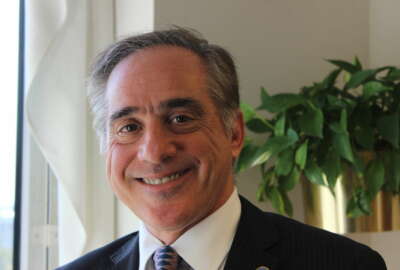
Shulkin promises employee accountability, VA Choice redesign if confirmed
David Shulkin, President Donald Trump's pick to lead the Veterans Affairs Department, earned high praise from the Senate committee during his nomination hearing.
Dr. David Shulkin, President Donald Trump’s pick to lead the Veterans Affairs Department, seemed to impress many senators at his nomination hearing Wednesday, as he assured members that with his confirmation and leadership, he wouldn’t just be “more of the same.”
“There is no doubt that if confirmed as secretary, I will seek major reform and a transformation to the VA,” Shulkin said during his Feb. 1 nomination hearing before the Senate Veterans Affairs Committee. “There will be far greater accountability, dramatically improved access, responsiveness and expanded care options, but the Department of Veterans Affairs will not be privatized under my watch.”
Committee Chairman Johnny Isakson (R-Ga.) said he sees an easy path to Senate confirmation for Shulkin and hopes he could take the helm as the leader of the federal government’s second-largest agency by the end of next week.
President Barack Obama appointed Shulkin to be the VA’s undersecretary for health in 2015 — following reports of long wait times at VA hospitals across the country.
“I don’t have a lot of patience,” Shulkin said. “I am going to be serious about making these changes and regaining that trust, and if I don’t do it, I should be held accountable, and you should replace me.”
Improvements to employee accountability procedures, a redesign of the Veterans Choice Program and a promise that VA health care would remain with the department are among Shulkin’s top priorities.
They’re priorities for the Senate committee as well.
Accountability has been a major theme for lawmakers and the VA itself, which grew frustrated in recent years when the Merit Systems Protection Board overturned punishments for three Senior Executive Service members.
And it’s certainly an issue Isakson said he would revisit.
“I want to see if we can work through this year to find a way, with labor and with our different interests from the two different parties, to say isn’t there some way that Dr. David Shulkin could have his agency set goals [and] be tested,” Isakson said. “If there is someone who doesn’t respond to the goals that are set for them and doesn’t respond to the care we want them to deliver, if there’s a way to have a disciplinary action that brings about accountability. I’d like to see you help do that. It may not be the reinstatement of the Merit System Protection Board. It may not be anything that I’ve talked about, but some way, we have to give you the tools that you need to run an agency of 314,000 employees and 6.5 million beneficiaries.”
The Senate VA Committee attempted to pass the Veterans First Act in 2016, which contained the VA’s own proposals for overhauling the sluggish appeals process and pieces of the secretary’s own plan to consolidate community care, along with new disciplinary procedures for VA senior executives.
But the bill never made it to the Senate floor.
Shulkin agreed. As secretary, he’ll want new accountability procedures.
“A basic function of any chief executive is to be able to get the right people working in the organization, and those that do stray from the values that we hold have to leave the organization,” Shulkin said. “We don’t currently have that right on either side, so I see this as a dual-pronged process. For those employees who really don’t belong in the organization, the secretary needs the ability to be able to remove them.”
VA stopped using a congressionally mandated authority to fire poor performers in 2016, after the Justice Department questioned its constitutionality. VA appealed the attorney general’s decision but DoJ announced it wouldn’t revisit the matter, Shulkin said.
“We’re going to need new tools and I’m going to need to come back to you,” he added. “We need to figure out a way that we can make what you wanted to happen work better and make it constitutional.”
Many senators also had questions about how the president’s recent, short-term hiring freeze would impact the department, and whether Shulkin would ask for additional exemptions, particularly for employees who handle veterans’ benefits claims and appeals.
Acting VA Secretary Rob Snyder announced exemptions to many health care, construction and burial positions last week. With those exemptions, VA can still actively recruit for 37,000 of the 45,300 vacant positions, Shulkin said.
If he and other VA leadership feel that the department needs more, Shulkin said he would ask the White House for more exemptions.
It’s been more difficult for VA to recruit for those 45,300 positions due to reports of long wait times at VA medical centers and years of bad press. That kind of dialogue, Shulkin said, has hindered the department’s ability to recruit and retain top talent.
He said he’d like to be able to offer more financial incentives to attract talented doctors and medical professionals and urged the committee for its help.
Isakson said he and committee Ranking Member Jon Tester (D-Mont.) plan to focus on telling good-news stories that come from the department.
‘We’re going to fix the slip-ups,” the chairman said. “[We’re} going to be telling the good stories of the VA, so you better be having some.”
Veterans Choice
Members of the committee from both parties reiterated: they have no intention of privatizing the department. Debates over privatization heated up last year, particularly after some members of the congressionally appointed VA Commission on Care recommended such moves.
Shulkin said he spoke with Trump about privatization when he met with the president before his nomination but he, like many committee members, said he does not support that suggestion.
Instead, Shulkin pushed an idea that he pitched back in 2015, suggesting that VA alone couldn’t meet veterans’ health care demands on its own and needed to develop stronger partnerships with outside hospitals, clinics and doctors.
The goal should be, he said, to combine the best care from VA and the best care from the community.
Both Shulkin and the committee acknowledged the pitfalls of the Veterans Access, Choice and Accountability Act, which Congress passed in reaction to 2014 reports of long wait times at VA medical centers.
“We added a layer of additional administrative complexity, where instead of the VA being able to help the veterans as they always did, they had to go through a third-party administrator,” Shulkin said of the current VA Choice program. “That led to a delay in care in many cases, too many cases. We need to take that layer of complexity out.”
Latest on Congress
But contrary to a Jan. 30 report from the department’s inspector general on the program, VA has improved veterans’ access to care, Shulkin said.
The IG found 1.3 million cases where veterans could not access VA care between November 2014 and September 2015.
But Shulkin insists the program is different today.
“It described, I think accurately, a program that was in disarray,” he said. “Since then, with your help, we’ve made four changes to the law, 50 contract modifications. We’ve completely changed the ability so that VA employees can make outbound calls.”
A better program should also come with more modern tools for VA employees, Shulkin added.
After many long debates, the VA is moving forward with a commercial scheduling solution, called MASS, Shulkin said. The department’s in-house solution, VistA Scheduling Enhancement (VSE), is deployed at 10 sites now. Shulkin said the department plans to decide whether it will continue to use that scheduling program by Feb. 10. Congress has long been frustrated by the delays and VA’s approach to finding a new scheduling solution.
Copyright © 2025 Federal News Network. All rights reserved. This website is not intended for users located within the European Economic Area.
Nicole Ogrysko is a reporter for Federal News Network focusing on the federal workforce and federal pay and benefits.
Follow @nogryskoWFED
Related Stories

Shulkin promises employee accountability, VA Choice redesign if confirmed




